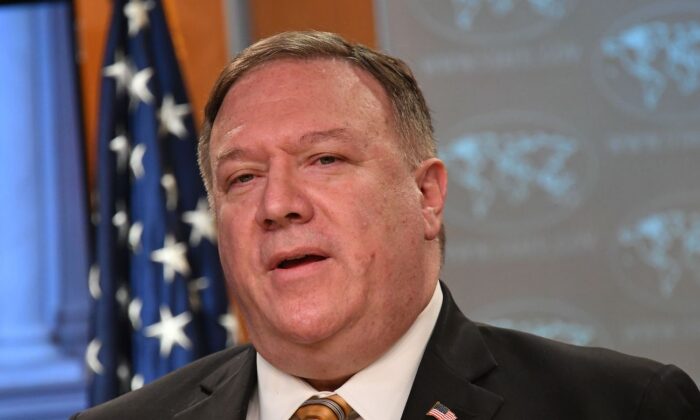The United States on Monday told the Taliban terrorist group to continue its commitments to a peace agreement, which include not attacking American troops, amid media reports alleging that Russia offered Taliban-linked terrorists bounties for killing U.S. and coalition troops in Afghanistan.
In a video conference with Taliban deputy and chief negotiator Mullah Baradar on Monday, Secretary of State Mike Pompeo “made clear the expectation for the Taliban to live up to their commitments, which include not attacking Americans,” State Department spokesperson Morgan Ortagus said in a statement on Tuesday.
Pompeo and Baradar were discussing the U.S.-Taliban Agreement, a peace agreement the United States signed with Taliban terrorists on Feb. 29. The agreement, which seeks to end 18 years of war in Afghanistan, drew up plans for a withdrawal of foreign forces from the war-torn country in exchange for security guarantees from the terrorist group.
As part of the deal, the United States would withdraw its troops by July 2021 in exchange for commitments from the Taliban to prevent terrorists from using Afghanistan as a staging ground for attacks.
Taliban political spokesman Suhail Shaheen told Voice of America that “Baradar once again reiterated that the Taliban are committed not to allow anyone to use Afghan soil [to launch attacks] against any country,” when Shaheen was asked whether the Russian bounties allegation was raised in the meeting.
Shaheen added that Baradar also reaffirmed the Taliban’s commitment to the U.S.-Taliban Agreement. He told VOA that Baradar told Pompeo the delay in talks was due to the Afghan government not having released all 5,000 Taliban prisoners, which was part of the deal.
Russian Bounties Claim
The New York Times and The Washington Post were among the first media outlets to publish the claims regarding Russian bounties, with the Post reporting on June 28 that several American soldiers were believed to have died as a result of the program. The Kremlin has denied such arrangements.
The Pentagon said in a statement late Monday that, to date, it “has no corroborating evidence to validate the recent allegations found in open-source reports” regarding Russian bounties.
White House Press Secretary Kayleigh McEnany also said on Monday that there is “no consensus within the intelligence community” on the Russian bounty claims, “and, in effect, there are dissenting opinions from some in the intelligence community with regards to the veracity of what’s being reported.”
On Tuesday, McEnany noted that President Donald Trump has been informed of the alleged Russian bounties. She said at a press briefing that the allegation “is unfortunately in the public domain because of The New York Times and the irresponsible leak,” and that Trump has not been informed by intelligence officials about the issue.
McEnany refuted the idea that the Russian bounties allegation was included in a written version of the president’s daily intelligence briefing in late February, as reported by The New York Times and CNN on Monday, both of which cited anonymous sources.
“The president does read [the President’s Daily Brief] and he also consumes intelligence verbally,“ she said. “This president, I‘ll tell you, is the most informed person on planet Earth when it comes to the threats that we face.”
Trump noted on June 29 on Twitter, “Intel just reported to me that they did not find this info credible, and therefore did not report it to me or [the vice president].” He also speculated that the Russian bounties claim was “possibly another fabricated Russia Hoax, maybe by the Fake News [New York Times], wanting to make Republicans look bad!”
Ivan Pentchoukov and Reuters contributed to this report.
Focus News: US Restates Expectation on Taliban to Cease Attacks on Americans in Afghanistan
